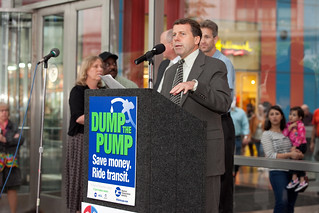A fifth Metra board member gave up his post Thursday after the Chicago Tribune wrote that Stanley Rakestraw no longer lived in suburban Cook County – as required – and the person who appointed him, Cook County President Toni Preckwinkle, asked him to tender resignation. Board members are resigning after allegations of double dipping (for being on two governmental boards simultaneously), patronage hiring and promoting, and for giving former Metra CEO Alex Clifford a severance package potentially worth over $700,000 in exchange for keeping quiet. The full amount would be available to Clifford if he fails to find a new job.
Meanwhile, Governor Pat Quinn today created the "Northeastern Illinois Public Transit Task Force, an "independent panel of transit, finance and good government leaders who will issue recommendations to reform the mass transit system in northeastern Illinois". The panel's aim is to investigate fraud and waste and it seems the task force will spend more time investigating the Regional Transportation Authority, which has oversight of Chicago Transit Authority, Metra, and Pace – the three "service boards."
Members of the "blue-ribbon" panel include Carole Brown, former chairperson of the Chicago Transit Authority board, Patrick Fitzgerald, former U.S. Attorney for this region, and Kathryn Tholin, CEO of Center for Neighborhood Technology. The task force will have co-chairs: George Ranney, CEO of Metropolis Strategies, who has proposed merging the Regional Transportation Authority into the Chicago Metropolitan Agency for Planning; and Ann Schneider, secretary of the Illinois Department of Transportation. Two union leaders, an advocate for people with disabilities, and a former CTA bus driver will join the panel.
Greg Hinz of Crain's Chicago Business says the panel has a tough road ahead and doubts "how much it will actually achieve." He writes:
For instance, Mr. Ranney, president and CEO of Metropolis Strategies, a civic group, and Ms. Brown long have been gunning to dismantle the Regional Transportation Authority, which arguably has been ineffective in regulating Metra, Pace and the CTA and which City Hall argues sucks up money that could go directly to CTA operations. Mr. Ranney has proposed merging RTA into the Chicago Metropolitan Agency for Planning.
Hinz reports that Joe Costello, head of the RTA, "would like his agency empowered, rather than merged away." DuPage County Chairman Dan Cronin, whose own appointee to the Metra board – Paul Darley – resigned last month, is concerned about Metra being affected by the "Chicago machine."
Transitized author Shaun Jacobsen wrote of his three "wish list" ideas on how to make the RTA more effective from a passenger perspective. The first, he said, should be "seamless ticketing." He notes that this is required by law for all three service boards by 2015, yet only CTA and Pace have a solution. Jacobsen also posted that CTA president Forrest Claypool doesn't want his agency to be included in RTA's structural changes, "because unlike scandal-scarred Metra, the CTA is 'accountable to the voters,' who know 'the buck stops' with the mayor," the Sun-Times reported.
The Chicago Tribune editorial board suggested today that everyone else should resign, without which "lofty paeans to restoring faith in Metra will mean nothing." The editorial proposes a test for whatever reforms the panel outlines: "Would this oversight structure encourage the hiring of top administrators who will run safe, efficient transit operations...transit bosses who won't play by the rules of Illinois politics?"
Chicagoland deserves a world-class transit system, but Metra drags down the region while CTA charges ahead. Will there be Illinois politics as usual, or can Quinn's panel come up with reform ideas that the state legislature can act upon? I'm curious to see if the panel recommends that voters should elect the service board members and if this affects next year's gubernatorial election.






